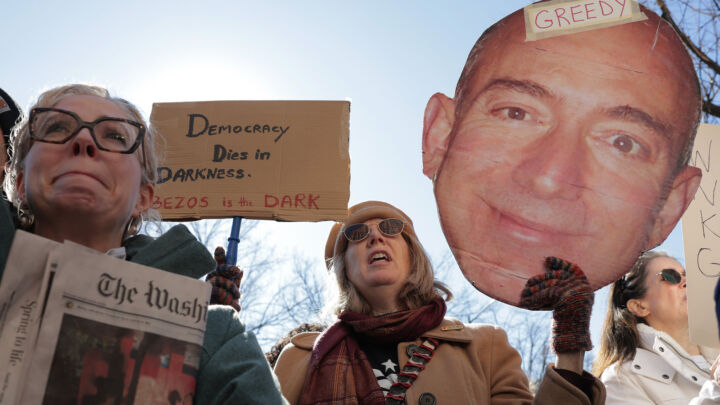Why did the BBC call Charlie Kirk ‘far right’?
The mainstream media are still demonising a man who was killed for his beliefs.

Want unlimited, ad-free access? Become a spiked supporter.
‘Mr Kirk built a huge and devoted following for his far-right views’, said the BBC’s North America editor Sarah Smith on Sunday. The statement came during the BBC’s coverage of Charlie Kirk’s memorial in Arizona, which was attended by tens of thousands of mourners and was addressed by US president Donald Trump.
Smith’s statement is nothing short of astonishing. It would be one thing for blue-haired keyboard warriors on Bluesky to be referring to dead conservatives as fascists. But it is quite another for the UK’s state broadcaster to toe that same line. The BBC pays Smith more than £200,000 a year to report impartially on American affairs. We would hope someone in her esteemed position might pause for thought before smearing a man who was killed for his beliefs.
The BBC isn’t alone in painting Kirk as ‘far right’. In the days following his murder, mainstream media rushed to portray him and his views as beyond the pale. The Guardian, like the BBC, described Kirk as ‘far right’, as well as a man who ‘stood for the darker themes of… US nativism’. The New York Times accused Kirk of leading a ‘hard-right youth movement’. It was also forced to make a correction after falsely attributing an anti-Semitic quote to him.
Needless to say, this is all pretty grotesque. Kirk has just been murdered – seemingly by a genuine extremist. Wittingly or not, smearing him as a fascist, dehumanising him in death, comes dangerously close to justifying or at least sanitising his killing.
In truth, none of Kirk’s political stances could be seen as ‘far right’ in any other time except the strange epoch we live in. Defending the US First Amendment, opposing abortion, being in favour of meritocracy and insisting that men cannot become women are not unusual stances for Christian conservatives or US Republicans. You do not have to agree with these positions to recognise they do not make someone far right.
In most cases, terms like ‘far right’, ‘fascist’ and ‘Nazi’ have become utterly detached from their original meaning. Smith unwittingly exemplified this in her coverage of Kirk’s memorial. In the very same sentence she derided him as far right, she also noted that he was popular for his ‘eagerness to debate’. That is not a trait you’d normally associate with a goose-stepping authoritarian.
Indeed, Kirk certainly had strong convictions, but he was always willing to hear them challenged. When appearing on college campuses, he offered the mic to students, often saying: ‘If you disagree, you go to the front of the line.’
If it is this commitment to free speech and debate that made him ‘far right’ to the likes of Sarah Smith and the BBC, then that says far more about them than it does about him.
Georgina Mumford is a spiked intern.
You’ve hit your monthly free article limit.
Support spiked and get unlimited access.
Support spiked and get unlimited access
spiked is funded by readers like you. Only 0.1% of regular readers currently support us. If just 1% did, we could grow our team and step up the fight for free speech and democracy.
Become a spiked supporter and enjoy unlimited, ad-free access, bonus content and exclusive events – while helping to keep independent journalism alive.
Monthly support makes the biggest difference. Thank you.








Comments
Want to join the conversation?
Only spiked supporters and patrons, who donate regularly to us, can comment on our articles.